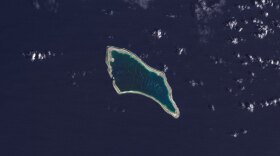Like many Pacific Islands, Hawaii has long relied on imports of oil and coal to generate electricity. Even in a first world economy - the transition to clean alternatives is proving a challenge. In Paris, at the UN Conference on Climate Change - Pacific Island Nations including some of the poorest countries on earth are demanding financial commitments from rich countries to help in their transition. Details from Neal Conan in Paris with the Pacific News Minute.
New Zealand spent millions to help its tiny territory of Tokelau to end its reliance on diesel and earlier this fall, it became the first nation in the world 100% powered by solar energy. But scale that up for a country roughly ten times as large - Tuvalu, for example. A hundred times the size – Kiribati, or a thousand times bigger – Fiji, and that's still tiny compared to Indonesia or India. In previous climate agreements, poor nations got pledges of a hundred billion dollars to help in the energy transition, but very little of that money ever appeared. For example, President Obama promised 3-billion dollars to the UN Green Fund, but Congress never authorized the money - arguing that there was no way to know if it would be spent and accounted for properly.
This time around, poorer nations want legally binding guarantees to help wean themselves away from cheaper but much dirtier fuels like coal and oil. Not loans, but reliable commitments of public funds - how much remains a major issue here.
Low lying island nations in the Pacific also want a loss and damage fund to cover the destruction from rising tides and more powerful storms. Richer countries like the US have opposed this in the past as a potential blank check. Earlier this week US chief negotiator Todd Stern said, "We haven't landed anywhere yet, but we hear the concerns of these countries and we think those concerns are legitimate."





